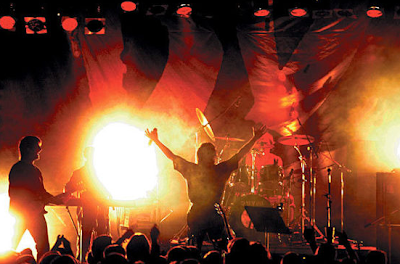DDT was another band from Leningrad. They were very successfull. Iurii Shevchuk fronted the band as guitar player and he was the main composer of songs for DDT. Shaped originally within the remote town of Ufa, Siberia's edge republic called Bashkir. But they constantly have trouble with native authorities thanks to Shevchuk’s uncompromising lyrics, that were crucial of the social issues. Some of them for example are the Afghan war, and therefore the forms and hypocrisy that made by the goverment of Soviet about their country's life.
In 1987 DDT moved to Leningrad (since renamed St Petersburg) to search for somekind of a liberal and inventive climate. They're remained active till this day and they are also very popular, with huge of following and massive audiences with their music which is mix of heavy metal progressive rock type of sound.
 |
| DDT |
Grazhdanskaia Oborona (Civil Defense) is one in all the Soviet/Russian bands with the best name for being ‘scandalous’ that, like DDT, became connected with Leningrad by finding for itself an officer ‘roof’ at the Leningrad Rock Club when things became troublesome in its native Siberian town of Omsk.
Grazhdanskaia Oborona was established in Omsk in 1984 by Egor Letov, one in all the foremost charismatic leaders of Russian nationalist rock, a composer and poet of extraordinary talent who is chargeable for combining a punk-infused coarseness of sound with ancient Russian bard-rock influenced tunefulness, hard-core aggressiveness, folkish melancholy and biting irony. Grazhdanskaia Oborona and its fans take into account the band to be punk. However, this can be once more manifest principally in matters of perspective and elegance.
Throughout the Soviet era, Letov was always criticism of what the Communists were doing to his beloved Russia. For these views, Letov suffered endless persecution at the hands of the Soviet authorities.
 |
| Grazhdanskaia Oborona |
In the Eighties, Moscow didn't manufacture an array of bands as illustrious as that of Leningrad. Nevertheless, there have been some necessary bands in Moscow, a number of them among the foremost influential Soviet bands of the time.
 |
| Zvuki Mu |
Zvuki Mu (Sounds of Moo) has been Moscow’s answer to the musical explosion that occurred in Leningrad. This band may be a singular and distinctive phenomenon in Russian rock, its influence on Soviet culture reaching way beyond the realm of rock music. In a way, Zvuki Mu has become an emblem of Russian culture of the amount, a metaphor of the complete Soviet method of life.
Created in 1981 as an experimental project by singer-songwriter Petr Mamonov and his brother guitarist Aleksei Bortnichuk but was disbanded by Mamonov in 1989 once reaching the peak of its Soviet and international success.
Zvuki Mu may be a product of Mamonov’s genius. Its poignant and primitive music, its stage show, its bizarre and profound lyrics, its mix of simplicity and class -- all this, along with exquisite musical arrangements by the band’s classically trained keyboard player Pavel Khotin, produce an expertise unmatched by something in Russian rock. Mamonov’s distinctive vocal vogue, primitive, nearly rudimentary guitar taking part in and strange body language – that verges on the obscene and is paying homage to the tradition of medieval carnival jesters -- makes him an especially effective and mesmerizing performer. He created on stage a grotesque image of a Soviet ‘everyman’: inarticulate, mentally impaired by vodka, sexually obsessed and impotent at a similar time and emotionally retarded, however still able to feel pain and to evoke compassion.
In 1989, British producer Brian Eno became fascinated with Zvuki Mu and issued their critically acclaimed album trendy Songs From Russia on his Opal label. once successfully touring the US and Western Europe.
(... to be continued)